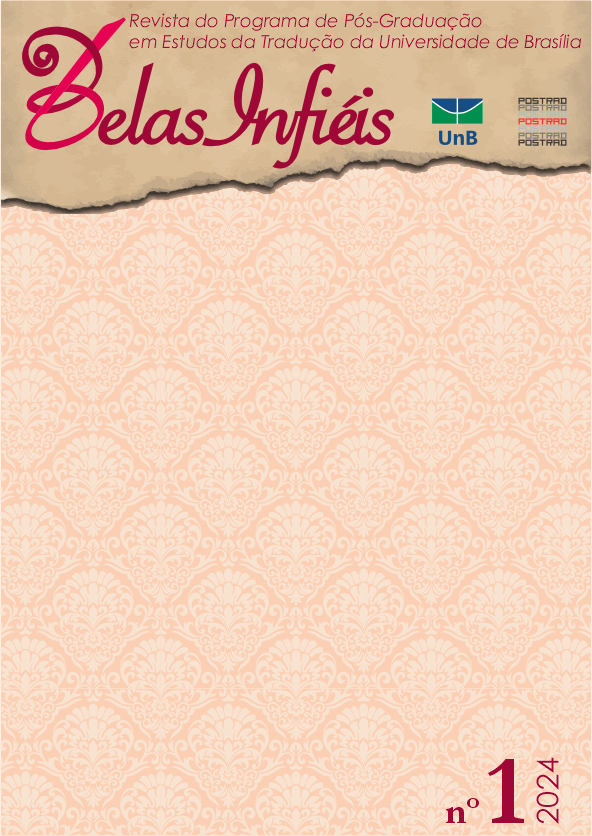Traduire l’écart ou pourquoi ne se fier à la fidelité
DOI :
https://doi.org/10.26512/belasinfieis.v13.n1.2024.51291Mots-clés :
La traduction d’après François Jullien. Dé- et re- catégoriser. L’écart et l’entre. Assimiler et désassimiler. La traduction et l'altérité.Résumé
Le philosophe, helléniste et sinologue français François Jullien a développé une méthode de percer quelques notions clés de la pensée européenne-occidentale en adoptant une autre perspective pour les sonder, celle de la pensée chinoise-orientale. Il propose une manière de « dé- et re- catégoriser un concept », c’est-à-dire, sans être paralysé dans un de ces deux points de vue, mais en se libérant d'un par l'autre et donc permettre qu'ils s'interprètent. C’est avec ce même exercice qu’il aborde la traduction. Il érige sa réflexion sur le thème en s’appuyant sur certaines propositions développées et éparpillées dans plusieurs de ses ɶuvres. La question qu’il se pose est: comment la traduction, ainsi que la pensée européenne -occidentale elle-même peut être renouvelée et, voire, être modifiée, en se traduisant une langue que n’appartient pas à la famille linguistique de l’indo-européenne, comme le chinois qui, en plus, est la seule langue existante aujourd’hui dont l’écriture n’est pas phonétique, mais idéographique. Pour répondre à cette question, il fait frémir certains principes qui sont à la base de la pensée helléniste et qui se répandent en ce qu’il appelle « le travail de traduction », comme les catégories d’Aristote et Kant, ou encore, l’Être, Dieu, la liberté etc. En critiquant des expressions qui généralement sont employées dans le débat sur la traduction, comme « perte », « trahison », « fidélité », « deuil », « différence », « équivalence », « comparables », Jullien illustre ses propositions avec des exemples pratiques de la traduction du chinois vers le français et vice-versa. Il raisonne la traduction en termes d’écart et l’entre. L’écart est le phénomène responsable pour ouvrir une distance qui fait paraître l’entre, l’espace où l’Autre – la langue et la culture source – est placé et entretenu en relation. La traduction opère dans l’entre ouvert par l’écart. Traduire, selon Jullien, est, dans un premier moment, assimiler pour, ensuite, désassimiler et, dans l’entre, laisser passer l’Autre, sans anéantir l’altérité. En somme, l’écart et l’entre instaurent le partage qui est la traduction.
Références
Jullien, F. (2008). De l’universel, de l’uniforme, du commun et du dialogue entre les cultures. Fayard.
Téléchargements
Publié
Numéro
Rubrique
Licence
© CC BY 2024

Cette œuvre est sous licence Creative Commons Attribution 4.0 International.
Copyright Statement
Given the public access to this journal, the texts are free to use but requires the recognition of the original authorship and initial publication in this journal to be properly stated.
The journal allows the use of works published for non-commercial purposes, including the right to submit the work to publicly accessible databases. Published contributions are the sole and exclusive responsibility of the author(s).
- When submitting papers to be evaluated by the Belas Infiéis journal, the author(s):
- Declare that the contents of the contributions are original and of their original creation, being entirely responsible for their content if there is an objection by third parties.
- Claim to be aware that they should not commit academic plagiarism.
- Declare that the manuscript has not been published, completely or partially, in Portuguese or another language. If it is a translation it should be submitted to the Translated Articles section.
- Declare that the manuscript is not being evaluated by other journals.
- Declare that the manuscript was not submitted to another journal simultaneously.
- Commit(s) to inform the journal of any kind of error or inaccuracy in their contribution (published, in evaluation or in editing) and to collaborate with the editors to make due corrections of the article (when in evaluation or editing) or erratum/retraction (after publication).
- Declare that there is no conflict of interest regarding the published work.
- Authorize its release if it is accepted for publication without any kind of monetary compensation.
- Agree to assign non-exclusive rights to publication to the magazine, remaining free to make their contribution available in other media as long as the publication of the first version in Belas Infiéis magazine is mentioned. They also authorize Belas Infiéis to assign their texts for reproduction in content indexers, virtual libraries and similar platforms.
- Maintain copyright and grant the journal the right of first publication, the work being licensed under theCreative Commons Attribution License.
- Is/Are allowed and encouraged to publish and distribute their work online after the editorial process, which may increase the impact and citation of the published work.
- Authorize the editorial team to make textual adjustments and to adapt the article to the publication rules, when necessary.



















